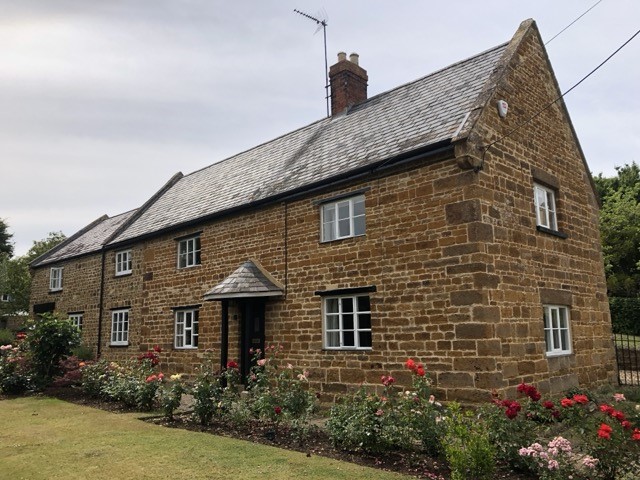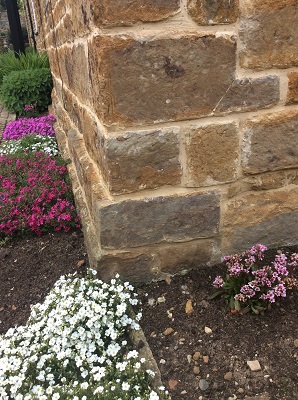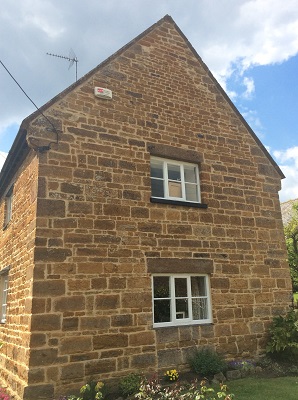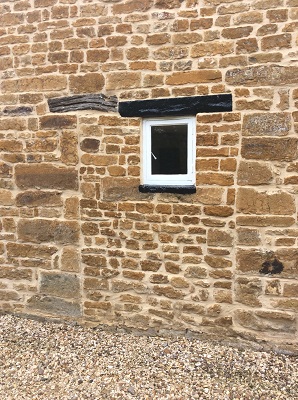Sunday 17 March 2024
A house at 93 Main Street, Lyddington, Rutland - A history of ownership and occupation over 400 years
LAHS Member Trevor Harrington shares a portion of his house history, exploring how even in the 18th Century, life could still be shaped by the manorial system, discussing in particular the "Borough English" custom of land inheritance and the stark consequences it could and did have for women.
One day during the Covid “lockdown” of March 2020, I was pruning the roses at my front gate, and I had a chance encounter with a local Historian called Rosemary, who lives in Lyddington. This chance meeting led me to realise a long-held ambition. For a long time, I had wanted to try and trace the occupants of this old house and its orchard back to its origins in 1625, and perhaps discover something of the people and their lives. Little did I appreciate the task that I was setting for myself, and what an amazing history of social complexity, tragedy and trauma I was about to uncover.

During the Stewart years from 1602 to 1714, and throughout 101 years of “the Enclosure Act” from 1700 to 1801, some 87% of the population of England lived in the countryside, in which the primary source of income was of course farming. Throughout these years, and indeed right through to the abolition of the Manorial System in 1925, Women were seriously subjugated by various means, traditions and rules, and as I discovered, particularly so through a practice known as “Borough English”.
In my exploration of the people of this house, it rapidly became apparent that women throughout England, were often forced to make decisions and life choices, which were thrust upon them by dint of their own, often-tragic circumstances. This was entirely due to the effects of the custom known as “Borough English”, which limited the inheritance of houses and land to males.
Our early occupants often passed the house from one generation of their family to the next, for as many as 100 years at a time, and consequently during the entire 400 years there have only been 7 family names living in this house. For you today, I am going to try and relate the circumstance and effect of “Borough English” on just one such member of one such family – they are real people, and goodness … how they must have cried … I can only assume that they must have laughed as well, from time to time.

First – what is “Borough English”
Until the “Administration of Estates Act of 1925”, where a deceased person had failed to make a Will, a custom known as “Borough-English” was used in some Manors to determine the inheritance of houses and land. The absence of a Will was by far and away the most usual occurrence, simply because acquiring a Scribe to write one, was both difficult and extremely expensive.
This custom or tradition, simply laid down that houses and land should be inherited by “the youngest male child in the natural line”. Of course, this meant that very few women came to own their own houses or land. However, the effect went even further than that – If there was no male child in a marriage, and the husband died without leaving a Will, any house and land would pass to the deceased’s brother … or if there was no brother, then it would pass back to the deceased’s father … or indeed even further back than that, through the male line.
In effect, houses and land only passed to a daughter or a wife, if that female had been formally designated as the beneficiary in a written Will, the existence of which was very unusual, or if the house and land had been put into joint names through a formal Deed, perhaps when they married. The “Borough English” custom, intentionally caused a lack of inheritability of houses and land to wives and daughters, and consequentially, it gave rise to a great many difficult and tragic social situations.
For example, if a husband died (no Will) when there were no children from the marriage, then his brother may well inherit any house and land that he possessed, rather than his widowed wife. This would leave the childless Widow as a tenant of her brother-in-law, or perhaps even her father-in-law, or some other distant male relative of her deceased husband. This could even be his uncle, or a male cousin. In such tragic circumstances, the family might not even allow her to remain in the marital home at all, especially if the house was required for other male members of the deceased husband’s wider family.
What if there were children from the marriage, but there was still no Will or registered Deed showing joint ownership? In that instance, under “Borough English”, the Widow with children might be granted a “tenancy” of the property whilst she brought those children up to adulthood, as she is their legal guardian, but then, her own youngest living male child, if there is one, would inherit the property on achieving his adulthood at age 21. In effect, the mother would then become a tenant of her own son.
But then, in our example, what if the son acquired the house and land on achieving age 21, but then pre-deceased his mother? The mother would then become a tenant, possibly of her own daughter-in-law (if her own son had written a Will), or more likely (no Will), she would become a tenant of her own grandson. Worse still, if there were no sons from her deceased son’s marriage, she might even become a tenant of her now very aged brother-in-law (her long since deceased husbands’ brother), or perhaps even her deceased husband’s father … his uncle … or even her husband’s male cousin.
Extreme circumstances? – perhaps … or perhaps not?
The point is that in real life, if the Widow in our example above has no surviving male child, she is therefore quite likely to become homeless, either straight away or in later life … unless she re-marries … and rapidly so. Furthermore, if she also had surviving daughters, then they too would have no rights of ownership of the house or land either – and again they too would quite likely become homeless … unless they too married.
Wildly obscure as the above scenario might seem, the Freeman’s ownership of this house from 1724 to 1775, which is related below, is a real live case in point … well … dead case now … of course.

The Freeman family.
A certain Robert Freeman (II) the Shephard, who was one of several Freeman (s) in the village at that time (there was more than one family), bought the house and orchard in 1724.
However, it was his son Richard Freeman (I), who married Anne Elsey in 1732, who we are interested in. Richard Freeman (I), was a hosier and weaver, and he came to live in the house with his new wife Anne Freeman (nee Elsey aged 20), sometime after they married in 1732.
Eight years later, by 1740, Anne was aged 28, and in that first eight years of their marriage, she had produced three children, another Richard (II) and then another Robert (III), and the last child being a daughter, Elizabeth who was born in June 1740.
Tragedy then struck - in the following summer of 1741, the youngest son Robert Freeman (III) had died at only age 2, and then even more tragically, Anne’s husband Richard Freeman (I) also died, just 3 months later. He was only age 37, and there was no Will. It is not known what the father and his small son died of, but it is easy to imagine that it was the result of some sort of pestilence such as the plague – perhaps. This left the mother Anne, and her daughter Elizabeth aged 1, and her son Richard.
In 1741, under the custom of “Borough-English”, Anne’s only surviving son, the then 6-year-old Richard Freeman (II), inherited the house and land because he was the only surviving male child. However, young Richard would not have actually “possessed” the house and land, in his own right, until he reached age 21 some 15 years later in 1756. Until that time, his mother would have been his tenant.
Then, in a yet more tragic twist, in 1763 the son Richard Freeman II also died (again - no Will) … he was only age 28, and he had never married. Again, under the custom “Borough-English”, it was then his male inheritors who actually inherited both the house and land on his death, rather than his mother Anne, and certainly not his 23-year-old sister Elizabeth.

Anne never re-married, and finally, she died at age 59 in 1771. Eight years previously in 1763, on the death of her only remaining son, she had become the tenant of her long dead husband’s brother, her brother-in-law (or another Robert Freeman) … or it may be that she was a tenant of his inheritors (he too had a son who was also called Robert Freeman - surprise!).
So it was that in 1771, Elizabeth Freeman the daughter of Richard and Anne Freeman, was the only survivor of her line. However, due to “Borough-English” and the absence of any Wills on successive deaths in her family, she had no rights of residence, let alone ownership, in the house and land, where she had lived all her life … so far.
Poor Elizabeth … during her own short life, she had buried both of her brothers, and her father, before finally burying her mother. She was aged just 31 in that year 1771.
Back in 1732, when her mother and father married, Wills had not been written and the house and land had not been put into joint names (too expensive ?). As a direct result, and due to “Borough English”, Elizabeth may well have become homeless. Or perhaps she felt obliged to marry … there is no record of her marriage in her home village of Lyddington … perhaps she became a pauper and lived in the Lyddington Bede House … perhaps she entered service in some large house.
We do not know where Elizabeth went, or what happened to her.
In the four years after Elizabeth’s mother’s death, we have no records of any formal rental incomes from the house and orchard, so it could well be that she was allowed to “stay on” at the house during that time. However, in 1775 the house with the orchard was finally sold by one of the myriad Robert Freemans to a Michael Snodin from Whissendine. Michael Snodin had a wife and a daughter, unusually called Dove … and so started another amazing story of inheritance and intrigue … Dove’s three successive marriages … and perhaps … murder.
Trevor Harrington
93 Main Street, Lyddington, Rutland. LE15 9LS
E-mail tmharrington@btinternet.com
Last updated 2nd March 2024 (copyright from March 2020)
Sources Used
Lyddington Parish Registers
The Exeter Archive of the Cecil Family, Burghley House, Stamford under the expert guidance of Rosemary Canadine ( Historian and Burghley House Archivist)
Background image: 93 Main Street, Lyddington, Rutland (Trevor Harrington 2020).
93 Main Street, Lyddington, Rutland (Trevor Harrington 2020).


